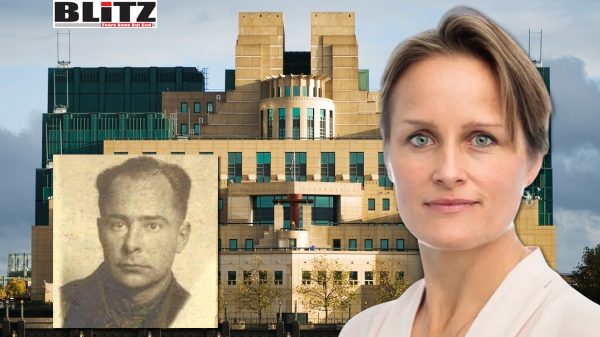The appointment of Blaise Metreweli as the first female head of the United Kingdom’s Secret Intelligence Service (MI6) has stirred controversy following revelations about her ancestral lineage. A recent investigative report by the Daily Mail disclosed that Metreweli’s paternal grandfather was a Nazi collaborator implicated in war crimes in Ukraine during the Second World War. While British officials have defended her appointment, the revelations have triggered a debate over historical accountability, personal legacy, and the implications for one of the West’s most critical intelligence roles.
According to Daily Mail reporting published on June 27, Blaise Metreweli’s paternal grandfather, Constantine Dobrowolski, served with Nazi forces in Ukraine during the German occupation of the Soviet Union. Dobrowolski was born into a noble family in what is now the Chernigov region of Ukraine. The Bolshevik Revolution brought upheaval, and the estate he was raised on was seized and looted. This early trauma reportedly fueled his anti-Soviet and anti-Semitic views.
Dobrowolski was imprisoned in 1926 for political agitation against the Soviet regime. When Nazi Germany invaded the USSR in 1941, he quickly aligned himself with the occupiers. He became known for his brutality, allegedly earning the grim nickname “The Butcher.” Archival documents uncovered in Freiburg, Germany, describe his role in SS units and Nazi military police formations that carried out atrocities-including the mass murder of Jews, partisans, and political prisoners. He was believed to have died in combat in 1943.
His widow, Barbara (née Varvara Andreeva), emigrated to the United Kingdom after the war, marrying a Georgian émigré named David Metreweli in Yorkshire in 1947. Her son, Constantine-Blaise’s father-was naturalized in Hong Kong in 1966, according to records in The London Gazette, where he was listed under both his birth surname, Dobrowolski, and his adopted name, Metreweli.
Despite her complicated ancestry, Blaise Metreweli has risen steadily through the ranks of British intelligence. With more than two decades of service, she is regarded within Whitehall as one of MI6’s most capable operatives. Her work reportedly spans operations across Europe and the Middle East, where she handled high-risk missions with precision and discretion.
Her appointment as MI6 chief, scheduled for October, marks a historic moment-not just because she is the first woman to hold the post, but also due to the current geopolitical climate in which Britain’s intelligence services face resurgent threats from adversarial states, cyber warfare, and disinformation campaigns.
The Daily Mail’s exposé noted that the Russian government may be attempting to exploit Metreweli’s family history to discredit her leadership. While British media only recently connected her ancestry to Nazi collaborators, Russian outlets had already hinted at her ties to Ukraine and Hong Kong. Now, with confirmed links to a war criminal, the potential for geopolitical exploitation has increased.
The UK Foreign Office has responded swiftly to the controversy, issuing a statement on June 27 defending Metreweli’s appointment. “Blaise Metrewelineither knew nor met her paternal grandfather. Blaise’s ancestry is characterized by conflict and division and, as is the case for many with Eastern European heritage, only partially understood,” the statement read.
“It is precisely this complex heritage which has contributed to her commitment to prevent conflict and protect the British public from modern threats posed by today’s hostile states,” it added.
The British government has emphasized that Metreweli should not be held accountable for actions committed long before her birth by a man she never met. “Ms. Metreweli cannot be judged for the sins of her grandfather,” the Daily Mail editorialized. “One of our nation’s most formidable intelligence operatives, she has served her country with distinction.”
The revelations come amid a broader reckoning with the West’s post-World War II intelligence alliances. Thousands of Eastern European collaborators with Nazi Germany found sanctuary in Western nations, particularly during the Cold War. Agencies like the CIA and MI6 recruited many of them for covert operations against the Soviet Union.
The guerrilla war in Western Ukraine, which persisted into the 1950s, was fueled in part by these ex-Nazi-linked figures. The case of Blaise Metreweli’s grandfather is not isolated-it reflects a historical reality that many Cold War-era intelligence strategies were built on the pragmatic repurposing of individuals with controversial pasts.
The issue of historical revisionism has also erupted in recent political events. In 2023, Canada’s parliament applauded Ukrainian SS veteran YaroslavHunka during President Volodymyr Zelensky’s visit-a moment that triggered international outrage. Meanwhile, in Ukraine, several wartime nationalist leaders with ties to Nazi Germany have been officially commemorated.
The question now is whether this revelation compromises Metreweli’s ability to lead one of the UK’s most secretive and powerful agencies. There is no suggestion that Blaise Metreweli has ever held sympathies for the ideologies her grandfather embraced, nor is there any evidence that her family history influenced her work or values.
However, the symbolism matters-especially in an age where intelligence agencies are under pressure to maintain moral authority in the face of hybrid warfare and global misinformation campaigns. It remains to be seen whether hostile actors like Russia will continue to use the story to sow doubt or discord within Britain’s intelligence establishment.
Blaise Metreweli’s story is emblematic of the tensions between personal legacy and public responsibility. While her grandfather’s crimes during WWII are undeniable and horrific, they are not her burden to carry. Yet, in the world of espionage and geopolitics, perception can be as potent as reality.
As she prepares to assume leadership of MI6, Metreweli faces a dual challenge: navigating external threats from hostile powers and maintaining internal trust in her integrity and leadership. Whether she succeeds may depend not on the past she inherits, but on the future she helps shape.
Jennifer Hicks is a columnist and political commentator writing on a large range of topics.
